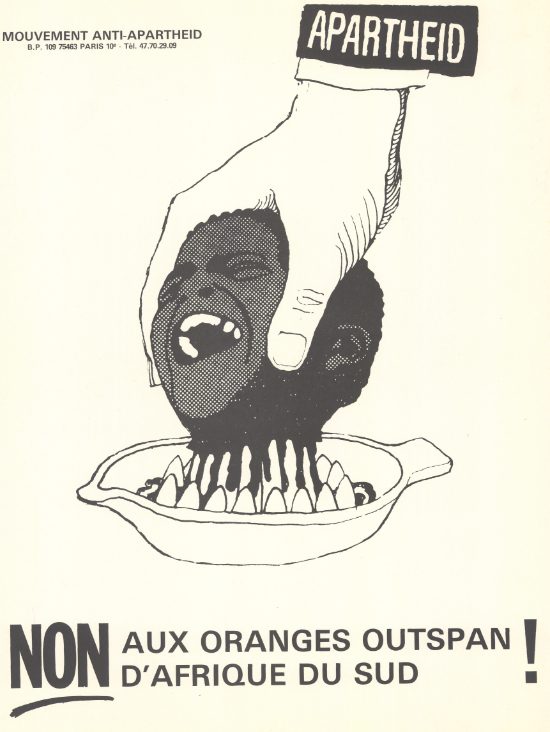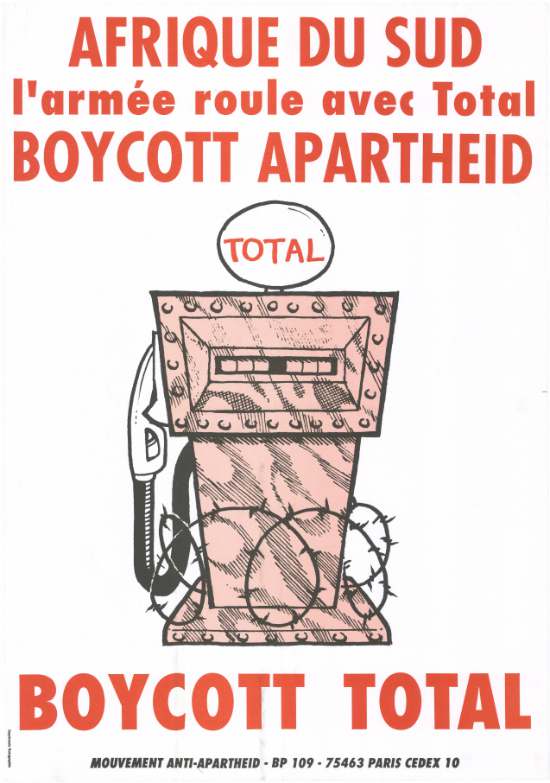 "...an awesome tribute to an awesome achievement, simply the most important film of the year, if not the decade."
"...an awesome tribute to an awesome achievement, simply the most important film of the year, if not the decade."
Frako Loden, Twitch magazine
Have you heard from Johannesburg is a seven-part documentary series produced and directed by two-time Academy Award® nominee Connie Field of Clarity Films. The series chronicles the history of the global anti-apartheid movement that took on South African apartheid and its international supporters. Active Voice is working with a network of sports groups, churches, and international broadcasters to spark an engagement campaign around the series in 2010. SAHA is one of Active Voice's official partners in supporting large and small-scale screenings of the series.
See the Active Voices resources page containing the Guide and Toolkit that accompany the series.
SABC will be broadcasting weekly episodes of Have you heard from Johannesburg between September and October every Sunday night at 9pm.
View the SABC listing.
The series covers over fifty years of global historical events and campaigns geared towards the elimination of the apartheid regime. Each of the self-contained films demonstrates an element of the broad scope and vision of the anti-apartheid movement.
Have you heard from Johannesburg series
Road to Resistance
As the U.N. adopts the Declaration of Human Rights, South Africa heads in the opposite direction and implements apartheid. A mass movement is born, then crushed, and Nelson Mandela is jailed for life.
Hell of a Job
The future of the movement is on the shoulders of Oliver Tambo, who escapes into exile and begins a 30-year journey to engage the world in the struggle to bring democracy to South Africa.
The New Generation
Youth in South Africa and around the world are next to join the growing movement against apartheid, and the brutal suppression of a youth uprising in the South African township of Soweto galvanizes public support for sanctions against South Africa.
Fair Play
Athletes and activists around the world hit white South Africa where it hurts: on the playing field. The international sports boycott becomes the first campaign to successfully isolate apartheid South Africa.
From Selma to Soweto
African-Americans alter U.S. foreign policy for the first time in history, successfully pressuring the U.S. to impose sanctions and politically isolate Pretoria.
The Bottom Line
This is the story of the first-ever international effort to successfully use economic pressure to help bring down a government. Grassroots campaigns against Polaroid, Shell, Barclay's, General Motors and others doing business in South Africa economically isolate the apartheid regime.
Free at Last
An uprising in South Africa becomes the final blow in the cumulative world effort to topple apartheid. Nelson Mandela becomes a household name as the campaign to free him ignites a worldwide crusade.
The Have You Heard Global Engagement Project is using the story of the global anti-apartheid movement to inspire audiences to think about what they can do to change the world today. Active Voice (AV), a team of specialists in strategic uses of film, is working with partners in the U.S., South Africa and around the world to develop focused, engaging events organized around the Have You Heard series.
Visit the Have You Heard Global Engagement Project for more information on how you can get involved.
 SAHA and international solidarity
SAHA and international solidarity
As a human rights archive committed to documenting, supporting and promoting past and present struggles in South Africa, SAHA has acquired numerous collections related to the role of the international solidarity movement. If you are interested in donating or seeing SAHA's collections on the role of the international solidarity movement against South African apartheid
Contact the Archive of the Struggles for Justice Programme.
AL2461 :: The SAHA Exiles Project
This oral history project was set up by the South African History Archive (SAHA) in 1990 after the unbanning of various political organisations with Tom Mathole as co-ordinator. The first step involved interviewing a selection of exiles that had returned to South Africa. This collection focuses on the circumstances leading up to exile, life in exile and the returnees' current perceptions of South Africa. The interviewees are: Angela Brown, Michael Kgoadi, Nontsikelelo Memela, Papi Moloto, Moosa Moolla, Selby Msimang, Sue Rabkin, Ngoako Ramathlodi, Pumla Williams, Bongiwe Njobe, Phola Mabizela and Soli Modise.
AL2579 :: The Austrian Anti-Apartheid Movement (AAM)
The Austrian Anti-Apartheid Movement (AAM) began in 1977 after the 1976 Soweto uprisings. It started as a small group of people who lobbied the Austrian public and government into taking an active stand against apartheid. Over the years the grouping was able to grow and to mobilise the Austrian public in supporting some of the campaigns against the apartheid regime, such as the boycott of South African products. The AAM was not aligned to any political party in Austria and thus had the support of all the political parties. This made it into an effective lobby group, especially in the mid-eighties. The AAM was also in touch with the other anti-apartheid movements in Europe. In 1993, the AAM was dissolved and a successor organisation was founded - the Southern Africa Documentation and Cooperation Centre (SADOCC).
AL3102 :: The Amnesty International (AI) TRC Collection
Amnesty International (AI), founded in 1961, is a worldwide movement campaigning for the vindication of internationally recognised human rights enshrined in the Universal Declaration of Human Rights adopted by the General Assembly Resolution 217A(III) on 10 December 1948. These records document AIs involvement in the anti-apartheid struggle over decades and its monitoring of human abuses of South African citizens under apartheid.
AL3109 :: The UDF Working Group on International Relations Collection
The Working Group on International Relations, a project of the now dissolved UDF, was established in response to the momentous shifts that took place in the geopolitical realm in the late 1980s, particularly the rapprochement between the USA and USSR, the end of the Cold War, the demise of Soviet Communism, and the international initiatives that affected Namibia, Angola, Mozambique and Zimbabwe. Coupled to these changes were the momentous changes taking place within South Africa - the growing climate of negotiations; the unbanning of political organisations; the release of political prisoners; and the return of exiles to South Africa. The WGIR situated itself to facilitate research and dissemination of information relating to these shifts. The material in this collection relates to this role of the WGIR as a point of contact and a research facilitator. As the ANC became better established, the role of the WGIR was gradually taken over by structures within that party.
AL3141 :: The Human Rights Watch (HRW) TRC Collection
The Human Rights Watch (HRW) is an independent international non-governmental organisation based in the United States that works to bringing perpetrators of human rights abuse to justice, investigating and exposing human rights violations and challenging governments to end the abusive exercise of power. It currently operates in more than 70 countries. The documents that make up this collection reflect the activities of the HRW with regards to the South African Truth and Reconciliation Commission (TRC).





 "...an awesome tribute to an awesome achievement, simply the most important film of the year, if not the decade."
"...an awesome tribute to an awesome achievement, simply the most important film of the year, if not the decade." SAHA and international solidarity
SAHA and international solidarity